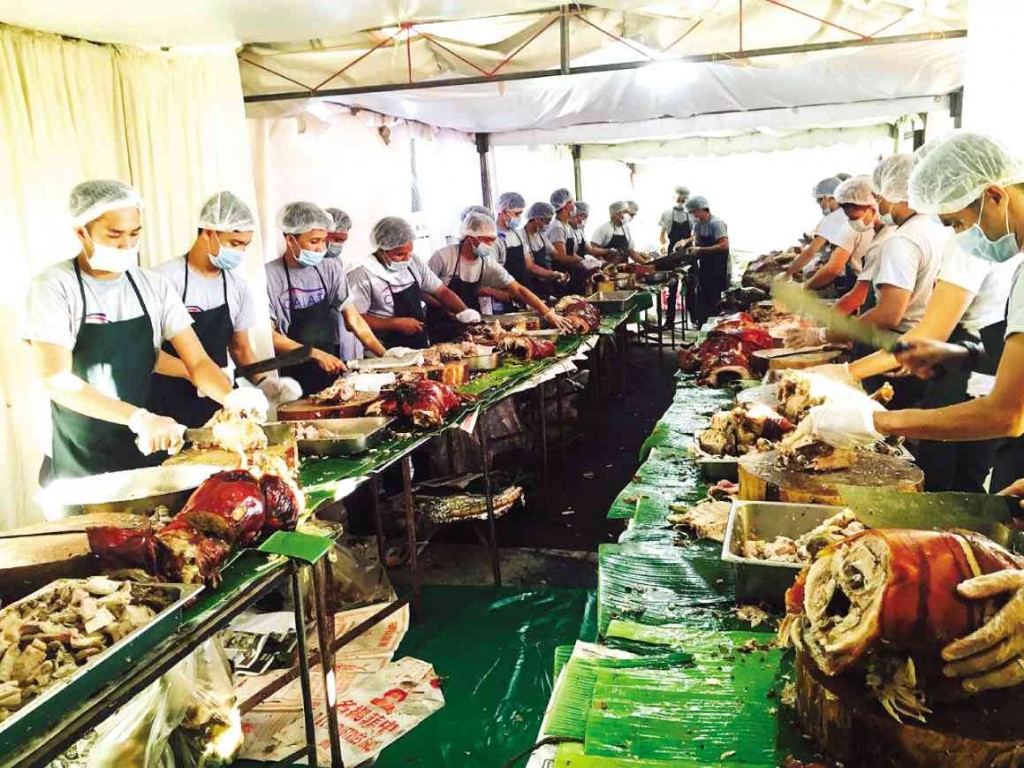Guinness record today, lechon empire tomorrow

CALATA Corp. has chalked up several milestones since November set in.
First, CAL turned 16 years old. Then showcased the Philippine lechon (roast pork), said to have been praised by renowned chef Anthony Bourdain as “the holy grail of pork,” in setting a new Guinness World Record on Nov. 8. Then hit the workweek running as the publicly listed company announced it was entering the lechon business.
Celebrating 16 years in business, CAL set a new world record for the largest lechon serving with the help of strategic partner Lydia’s Lechon, one of the top lechon brands in the country.
The effort yielded 4,046 kilograms of lechon served at the Quezon City Memorial Circle, beating the previous record of 3,094 kg of cochinita pibil (a popular roast pork dish in the Yucatan region) served in Mexico in 2010. Guinness adjudicator Lucia Sinigagliesi of Italy was on hand at the event to confirm the new record.
CAL chair and CEO Joseph H. Calata said the occasion was the perfect kick-off for a new business line.
True enough, after the Guinness feat, CAL announced a new line of business through a disclosure to the Philippine Stock Exchange.
“In conjunction with the setting of such world record, the company formally launched its entry into the roast pork or ‘lechon’ business—a new segment in its meat business. With this launching, a strong business partnership with leading industry players such as ‘Lydia’s Lechon’ has been established together with continuous plans for the formation of more profitable and aggressive business synergies,” corporate secretary Jose Marie Fabella said.
With the onslaught of Christmas, yearend, and New Year parties coming, now is certainly as good a time as any to start a lechon business. And CAL seems to have timed its new business well.
CAL said it expects this new business to soon comprise a significant portion of its consolidated revenue.
Citing “conservative” projections, CAL said it may generate additional 15 percent annual growth due to “aggressive expansion,” including possible acquisitions of related businesses.
“Calata Corp. continues to be at the forefront in the promotion and support of agribusiness to ensure food security in our country and at the same time increase shareholder value for all its stakeholders as a result of profitable operations,” Fabella said.
Yet the Guinness feat was not just for the company to highlight a new business but also to put the spotlight on the livestock business, Calata said.
Those in the Department of Agriculture (DA), meanwhile, say there are bright prospects in the meat business, be it on the piggery side or lechon making side.
According to DA data, investing P8,500 in a starter piggery could result in an initial yield of P10,500 in sales.
CAL is one of the biggest agricultural conglomerates in the Philippines, forging strategic partnerships with key firms around the world in pursuit of best practices and products.
Calata said that his company takes pride in being the largest retailer and distributor of top agrochemical brands, feeds, fertilizers, veterinary medicines, and seeds throughout the country.
One of the company’s retail stores is AGRI—the largest retailer of brands like AGRI Crop Protection, Thomson and Hine, and Ivansmith agrochemicals. It also carries local and multinational brands such as Bayer, Sygenta, and Marubeni products, to name a few.
A tie-up with TopigsNorsvin Netherland now supplies genetically superior pigs to local breeders, while an arrangement with an Argentinian agricultural mechanization firm has resulted in the debut of automated corn planting in the country to substantially increase production while supporting direct or “zero tillage” farming, already standard practice in more advanced agricultural economies.
CAL’s “meat fabrication” facility also supplies quality stock to large grocery chains and restaurants. With the launch of the company’s lechon business, it has gone full cycle from farm to plate.
